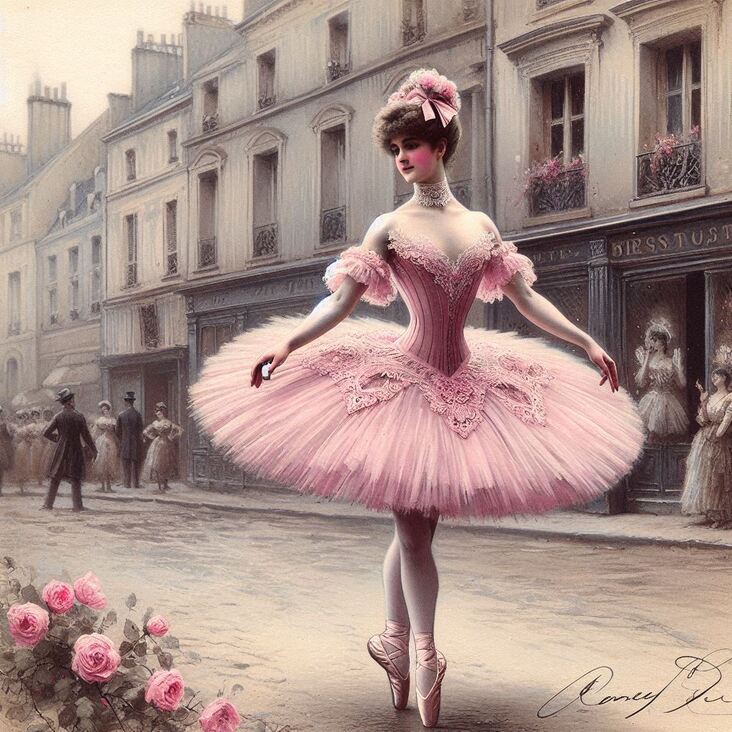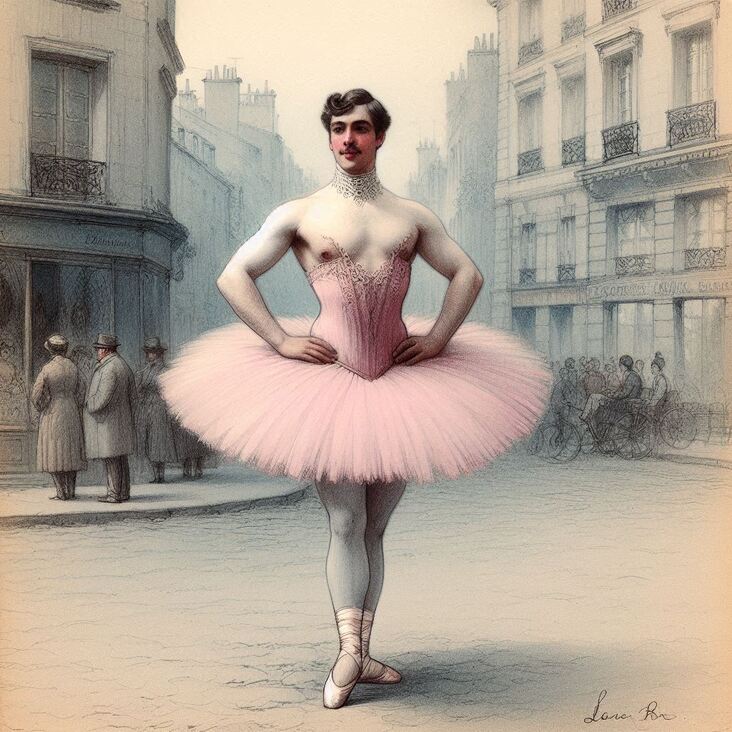
Hello my darlings! It’s Emma, your ever-so-pink tutu-loving time traveller, and it’s another #TutuTuesday, the day we take a whirl through history and uncover the delightful, dance-filled story of our beloved tutu.
Today, my little tutu-phants, we’re heading back to the late 1880s, a time when society was still very much bound by tradition. You might be surprised to know that even in the world of dance, the very concept of a tutu was in its infancy! You know me – a firm believer that there is no time better for twirling than the now!
Back to the Ballet-loving Past
The date is 3rd July, 1883 – the sweltering heat of London summer. I just hopped off the train from my charming hometown of Derbyshire, dressed, of course, in the most delightful pink and blue dress and an eye-catching pink feathered boa. I know, I know - a touch theatrical even for me!
What makes today a special day for a tutu enthusiast like me? It’s the day that we’ll see a revolutionary ballet performance at the Theatre Royal, Drury Lane. No, my dear reader, this performance won’t involve a bevy of ballerinas clad in delicate tulle and satin. Instead, it is a landmark ballet called ‘Giselle,’ that revolutionised our world of ballet. Imagine! No full skirts with romantic pannier-style underskirts yet! No layered tiers of gauzy tulle. This is the time of a revolutionary ‘skirtless’ look for dancers - a sort of shorter ‘roman’ style that would leave even the most devoted tutu-phile confused. I’m certainly hoping to catch a glimpse of the daring fashion at tonight's show, because you all know how much I love ballet fashion – and it’s just fascinating to see how styles have changed.
Now, the 1880s might have been the age of bustle skirts and corseting for everyone else. But in the ballet world, it seems a kind of artistic revolution was brewing. It was time to leave those restrictive, heavy skirts behind and make a statement. The new, shorter ‘roman’ skirts were quite daring in a society of layered clothing and grander designs. Imagine, my loves, those graceful ballet legs showcased for the first time. You might not call it a tutu exactly, but for the era, it certainly was a breakthrough. It was like, “Look at these long limbs, ladies and gentlemen, in motion – free at last from restricting garments!” And believe me, these pioneering dancers looked stunning in those revolutionary, elegant styles. They danced with such graceful precision, making even me want to skip onto the stage!
Now, don’t get me wrong. I do believe there is beauty and elegance in those historical, grand styles - it’s why I love exploring ballet history! I do a fair amount of research - between waltzing, sipping my chamomile tea, and indulging in some delectable confectioneries at the grand London hotels (oh, they do serve such splendid afternoon teas!). The way ballerinas moved in those longer dresses with tiers of flouncy fabric must have been an entirely different style of graceful elegance and would be beautiful to see, especially as we go back in time. Just imagine – so many layers and draping for a more romantic, and arguably, dramatic silhouette!
Speaking of revolutionary dance, there is just something about these grand 19th century dances like The Waltz which capture an aura of romanticism that simply couldn’t be replicated with the simple skirt designs in ballet in the 1880s! The intricate steps of The Waltz were born from this world of lavish full skirts that would behave just like dancers on stage! The ladies in all their flouncy frills swirling on the ballroom floor - such romanticism, so stylish!
The truth is, it took some time for a ballerina’s silhouette to transform completely, with shorter ‘roman’ designs, or those elegant styles which would eventually become the famous ‘tutu’ we know and adore today. These longer 'pannier' designs of the 1880s remained a popular choice in ballet for several years to come – even well into the early 20th century. A real testament to that romantic silhouette’s elegance and allure, wouldn’t you say?
London Calling!
But back to the grand world of ballet! Today’s trip will certainly involve visiting the beautiful London shops, perhaps a few decadent shops on Regent Street, where I will try to catch a glimpse of the new season's designs and colours. I hear they have an amazing shop that boasts the best millinery for feather boas, which are simply must haves in my world – it’s so wonderful that feathered trims and boas will soon be so fashionable for us gals. Just a touch of extra flourish, wouldn’t you say?
Then tonight, I'm off to the Theatre Royal, Drury Lane! What a glorious experience it is to take a step back in time and enjoy a real, live theatre performance! That’s how I do it – a perfect blend of ballet history, a few lovely purchases, and a touch of whimsical charm and, of course, a sprinkle of pink tutu fabulousness. And to think that we will see the tutu's development so many years in the making as the twentieth century arrives! Just think how exciting those styles will be. I do love all of our ballet history, but the modern era with its modern variations and its use of colour in fabric choices...it’s just wonderful. All I have to say is “Bravo, ballerinas, bravo!”
Don’t forget to join me here again next week, as I travel to a new date and tell you another fascinating story about our adored tutus and how we came to twirl in them with joy. And never forget, darling, even a little sparkle can add some wonder to any day. Until then, be kind to your neighbour, always find an occasion for a twirl and wear pink whenever you can!
With Love & Tutu Kisses,
Emma
P.S. I must say it’s rather intriguing to imagine the modern world and how those grand waltzes have evolved in ballroom dancing. Perhaps, if my pink-tutu-wearing self could venture forward a few more years I will get to witness those graceful and modern dances on the grand ballroom floor! And let's not forget the glorious styles in modern ballet as well. It will be so interesting to compare and contrast the ballet styles through the decades!

